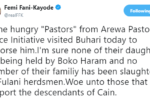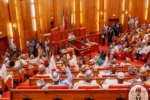The judge urged politicians to learn from former President Goodluck Jonathan and erstwhile Governor of Ekiti State, Kayode Fayemi, who he said were exemplary political characters. Besides, Justice Kolawole took an indirect swipe at the Attorney General of the Federation and Minister of Justice, Mr. Abubakar Malami, SAN, for giving “a partisan or otherwise legal opinion in a contest that is not exclusively an APC affair, but involves multiple political parties”.
The judge observed that the opinion the AGF expressed at a public forum concerning the Kogi matter, probably informed INEC’s decision to allow APC to substitute its late governorship candidate, a development he said culminated into the flurry of suits that were lodged before the High Court. Justice Kolawole however acknowledged that under Section 150(1) of the 1999 constitution, as amended, the AGF, can be called upon as the Chief legal adviser of the Federation, to give clear legal directions to agencies of the Federal Government.
“I am not in doubt that all the issues of law and facts that were raised before this court can be canvassed before the governorship election petition tribunal. I have no doubt that all the legal issues are such that the tribunal has jurisdiction to entertain. This judgement shall not operate before the election tribunal as res-judicata as this court has not decided any of the suits on the merit.
Though the court as the judicial arm of government, has a duty to not only uphold and protect the constitution, but to avoid decisions which will undermine or endanger the democratically laid down electoral process. “The process, no matter how imperfect or faulty it may be, is the only means by which any citizen who is aspiring for an elective office can assume governmental power.
“Court has power to assume jurisdiction in a way and manner that will assist the system to run its full course. The laws have made provision for an election tribunal, which is an alternative forum where disenfranchised candidates can go to ventilate their grievances. “Let me state it again lest I be misunderstood, this court has not in this matter, taken a position similar to that of the Biblical Pontius Pilate, the governor of the Jews who washed his hands off the blood of the innocent.
“Where the court has jurisdiction, I am confident that the arms of the law is not too short for it to make the necessary declaratory orders. However, the court will only do so within the parameters of its statutory and constitutional powers.
“The plaintiffs’ course of action is within the event of the Kogi state election of November 21, which is not cognizable by the Federal High Court under section 285(1) of the constitution and section 87(10) of the Electoral Act. “With all I have said, the four suits are hereby struck out for lack of jurisdiction. There shall be no order as to cost”, Justice Kolawole added.
The court yesterday adopted the same reason and also struck out Faleke’s suit yesterday. Aside Wada and Faleke, the three other suits were lodged before the high court by the governorship candidate of the People for Democratic Change, PDC, in Kogi state, Hon. Emmanuel Daikwo, a legal practitioner, Mr. Johnson Usman, a House of Reps member for Ahiazu Ezinaehitte Mbaise Federal Constituency of Imo State, Hon. Rafael Igbokwe and an electorate from Omala LGA in Abelijukolo Ife of Eche ward in Kogi state, Mr. Stephen Wada Omaye.
With the exception of Falake’s case, the court earlier consolidated the other four suits that were dismissed, yesterday. The plaintiffs had upon consolidation of their suits, distilled out three issues they urged the court to determine. They prayed the court to go ahead and determine, “ Whether in view of Section 181 of the Constitution of the Federal Republic of Nigeria,1999 (as amended) INEC ought to conduct a fresh Governorship election in Kogi State.
As well as “ Whether having regard to the provisions of sections 31(1)(2)(4)(5)(6)(7) and (8), 33, 34, 36, 85 and 87 of the Electoral Act, 2010, as amended, as well as sections 178-181 of the constitution of the Federal Republic of Nigeria, as amended, INEC, can lawfully conduct a second/supplementary election into the office of Governor of Kogi state on December 5, 2015, or any other date at all let alone accepting the nomination/substitution by the APC of any candidate on the basis of votes computed and credited to the deceased candidate of the APC when the new or substitute candidate was not part of the original election.
This page has been viewed 342 times
Tags : politics





























